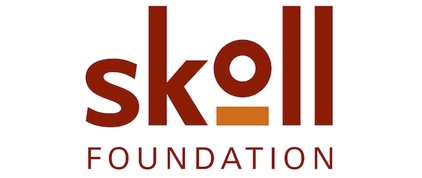The Skoll Foundation gives grants to social entrepreneurs – change makers who use innovative approaches to address difficult social problems. The foundation was founded in 1999 by Jeff Skoll, the first president of eBay. The Skoll Foundation’s work is organized around six priority issue areas: environmental sustainability, education, economic opportunity, health, peace and human rights, and sustainable markets.

In the CIMA survey, each donor was asked to rate from high to low in terms of priority the types of media interventions it supports.
Support that strengthens information flows
The bulk of Skoll’s support goes to entrepreneurs, and thus does not focus on the news media as a sector or on building institutions. However, there are several examples of funding that intersect with journalistic work and the expanding boundaries of media development. Skoll’s four 2015 awardees each received $1.25 million over three years as “core support investment to scale their work and increase their impact,” according to the foundation’s website. One of the awardees, Ma Jun, is a Chinese investigative journalist whose organization, the Institute of Public & Environmental Affairs (IPE)., “gathers and analyzes hard-to-find, public environmental data on water and air quality and environmental violations records across China. IPE makes this data accessible and easy to use, so that the press, investors, and citizens can hold suppliers, multinational corporations, and local governments accountable,” according to the website. Other activities include an Information Transparency Index rating multinational brands’ environmental impact, and a mobile app providing information on pollution and polluters.
Support to journalistic coverage of entrepreneurship
The foundation gives some support to journalists with the express aim of improving the public’s understanding of entrepreneurship. Skoll supports “media stories about social entrepreneurs” in support of its mission, to “drive large-scale change by investing in, connecting, and celebrating social entrepreneurs and the innovators who help them solve the world’s most pressing problems,” according to Sandy Herz, director of global partnerships, in response to CIMA’s survey.
A global organization without regional focus, according to Herz, Skoll spent $850,000 in fiscal year 2014 on media programs that support journalistic coverage of social entrepreneurship. The channels supported in these programs, in descending order of importance, are television, radio, print media, and Internet-based media. This support appears to be focused on U.S. media, as in this special series on NPR. This strategy is “designed to achieve broad reach among educated, affluent and influential audiences globally to drive awareness of social entrepreneurs with high quality programming at the lowest cost per story impression,” according to Herz. Skoll has also partnered with the Sundance Institute since 2007, providing documentary film support for projects focused on the impact of social entrepreneurship.
Skoll’s work has resulted in a number of successful media development ventures. A decade ago, for example, Skoll gave funding to Search for Common Ground, an organization that uses media to as a peacebuilding tool, and Witness, which uses video as a tool for human rights advocacy. More recently Skoll funded Medic Mobile, a health technology tool that uses mobile phones to communicate and coordinate for better health care. While media and information are not a key focus of Skoll’s investments, it is clear that the foundation recognizes the critical value of the media and information technology in achieving impact on development.
$850,000
Support for Media Programs in 2014
Website: www.skollfoundation.org
Twitter: @skollfoundation
Report Author: Tara Susman-Peña
Added: March 2017